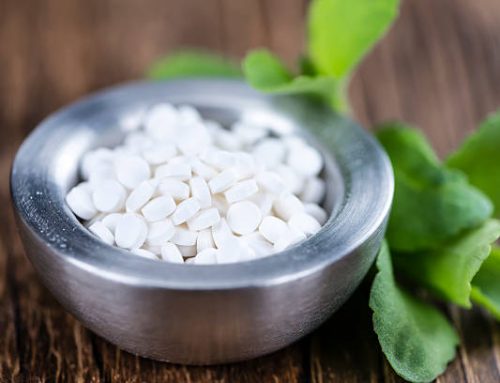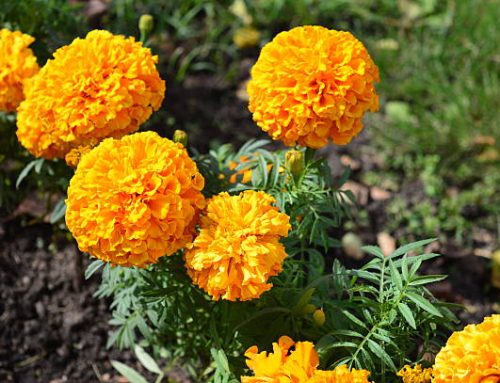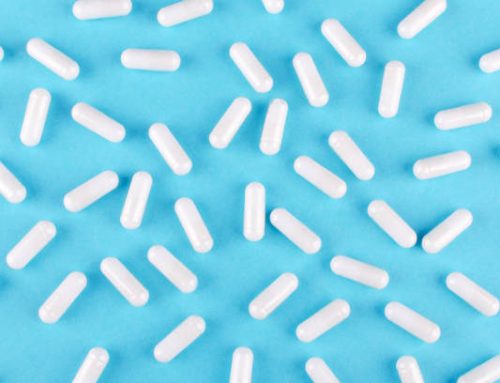As we navigate the ins and outs of modern medicine, it is easy to forget the invaluable contributions of ancient plant species that have cemented their place in history as herbal remedies. Butcher’s Broom, an evergreen shrub known for its medicinal benefits, has been used for centuries as a natural remedy for various ailments. It may surprise you to learn that this unassuming plant contains a treasure trove of scientific wonders waiting to be explored. From its ability to boost blood circulation to its antioxidant properties, Butcher’s Broom is a fascinating subject of discussion for scientists and health enthusiasts alike. Join us as we dive deep into the scientific wonders of this captivating plant and explore how it can bridge the gap between traditional and modern medicine.

1. Introducing Butcher’s Broom: A Natural Wonder with Scientific Benefits
Butcher’s Broom, scientifically known as Ruscus aculeatus, is a small evergreen shrub native to the Mediterranean region. It has been used for centuries to treat various health conditions like hemorrhoids, venous insufficiency, and varicose veins. The plant’s root and rhizome are used medicinally, and it contains active compounds that provide numerous health benefits.
One of the benefits of Butcher’s Broom is its ability to improve blood circulation. The active compounds in this plant help to constrict blood vessels, reducing inflammation and improving blood flow to the affected area. This effect makes it helpful in treating various conditions like swelling, leg cramps, and chronic venous insufficiency.
Another benefit of Butcher’s Broom is its ability to reduce inflammation. The plant contains anti-inflammatory compounds that help to reduce swelling and inflammation in the body. This makes it useful in treating conditions such as arthritis, gout, and other inflammatory diseases.
Butcher’s Broom is also known for its diuretic properties, which help to reduce water retention. This effect makes it helpful in treating various conditions like edema, bloating, and other conditions that cause water retention.
In addition to its medicinal benefits, Butcher’s Broom is also used in the cosmetic industry. Its anti-inflammatory and vasoconstrictor effects make it useful in treating dark circles and puffiness around the eyes. It is also used to reduce the appearance of varicose veins in the legs.
In conclusion, Butcher’s Broom is a natural wonder with numerous scientific benefits. From improving blood circulation to reducing inflammation and treating water retention, this plant provides numerous health benefits. Its cosmetic benefits make it a popular choice in the cosmetic industry. Overall, Butcher’s Broom is a valuable plant with endless potential for use in various industries.
2. Unveiling the Mysteries Behind Butcher’s Broom’s Medicinal Properties
Butcher’s broom, also known as sweet broom or knee holly, is a plant that has been said to possess medicinal properties for centuries. Its scientific name Ruscus aculeatus, is derived from the Latin word “ruscus,” which means “to break.” This evergreen shrub is native to the Mediterranean region and has been used for a variety of ailments ranging from circulation problems to skin issues.
One of the most intriguing things about butcher’s broom is that it contains a unique compound known as ruscogenin. This triterpene sapogenin has been shown to possess anti-inflammatory properties and is commonly used in the treatment of chronic venous insufficiency. Butcher’s broom has been shown to help reduce swelling, improve blood flow, and even decrease leg pain associated with varicose veins.
In addition to its anti-inflammatory properties, butcher’s broom has also been shown to possess antioxidant and diuretic properties. Antioxidants are important for neutralizing free radicals in the body that can lead to cellular damage and oxidative stress. Diuretics help to increase urine production, which can help reduce excess fluid buildup in the body and promote detoxification.
Butcher’s broom has also been used as a natural remedy for hemorrhoids. Its anti-inflammatory and vasoconstrictive properties help to decrease swelling and improve blood flow to the affected area. This is particularly beneficial for individuals who experience discomfort due to the pain, itching, and bleeding associated with this condition.
Lastly, butcher’s broom has been shown to have positive effects on the digestive system. It can help reduce inflammation in the bowels and relieve symptoms associated with irritable bowel syndrome (IBS). This is due to its ability to strengthen the walls of blood vessels and reduce fluid accumulation in the tissues.
In conclusion, butcher’s broom has a long history of being used for medicinal purposes, and scientific research has proven its effectiveness in treating a variety of conditions. From reducing inflammation and improving blood flow to promoting detoxification, this plant packs a powerful punch of health benefits. If you are looking for a natural remedy for any of the aforementioned ailments, it may be worth considering butcher’s broom as part of your treatment plan.
3. Let’s Talk Science: The Active Compounds that Make Butcher’s Broom an Effective Supplement
Butcher’s broom (Ruscus aculeatus) is a medicinal plant that grows in Europe, North Africa, and Western Asia. It has been traditionally used for centuries as a natural remedy for various ailments, including problems with blood flow, inflammation, and urinary tract infections. Recently, butcher’s broom supplements have gained popularity among people who seek natural alternatives to improve their health. In this post, we will explore the active compounds that make butcher’s broom an effective supplement and their scientific basis.
1. Ruscogenins: The Main Active Compound
Ruscogenins are a group of steroidal sapogenins that are found in high concentrations in butcher’s broom roots. They are responsible for the various pharmacological effects of the plant, including its ability to reduce inflammation, constrict blood vessels, and improve blood flow. Studies have shown that ruscogenins can suppress the production of inflammatory cytokines in the body, such as TNF-α and IL-6, and inhibit the activity of enzymes that break down collagen, which is essential for maintaining the integrity of blood vessels.
2. Flavonoids: Antioxidants with Benefits
Flavonoids are a group of polyphenolic compounds that are widely distributed in plants, including butcher’s broom. They are known for their antioxidant and anti-inflammatory properties, which can help protect the body against damage from free radicals and reduce the risk of chronic diseases. Some flavonoids present in butcher’s broom, such as rutin and hesperidin, have been shown to improve capillary resistance and decrease permeability, thus contributing to the plant’s traditional use for venous insufficiency.
3. Saponins: A Diverse Group of Molecules
Saponins are a group of complex glycosides that are widely distributed in plant species. They have diverse biological activities, including antifungal, antiviral, and antitumor effects. In butcher’s broom, saponins contribute to the plant’s hemostatic and diuretic properties by promoting blood clotting and increasing urine production. One of the main saponins found in butcher’s broom is neoruscogenin, which has been shown to inhibit platelet aggregation and promote vasodilation.
4. Other Compounds: Minor Players with Potential Benefits
In addition to the above-mentioned compounds, butcher’s broom contains other minor bioactive molecules that may contribute to its health-promoting effects. These include triterpenes, anthocyanins, and essential oils. Triterpenes have been shown to have anti-inflammatory and anti-tumor activities, while anthocyanins are potent antioxidants that may play a role in protecting the heart and improving cognitive function. Essential oils, on the other hand, contribute to the plant’s distinct aroma and may have antimicrobial properties.
In conclusion, the health benefits of butcher’s broom are due to its wide range of bioactive compounds, including ruscogenins, flavonoids, saponins, triterpenes, anthocyanins, and essential oils. These compounds have been extensively studied for their pharmacological activities and provide a scientific basis for the traditional use of the plant. If you are looking for a natural supplement to improve your circulation, reduce inflammation, or boost your urinary tract health, consider butcher’s broom, and make sure to choose a high-quality product that contains standardized levels of its active compounds.
4. Bridging the Gap: The Connection Between Butcher’s Broom and Cardiovascular Health
Butcher’s Broom (Ruscus aculeatus) is an evergreen shrub, native to the Mediterranean region. It has been traditionally used for many years as a medicine to promote circulation and treat various cardiovascular conditions. Recent scientific research has found evidence to support its use in cardiovascular health. Here are the key ways in which Butcher’s Broom can benefit the heart:
- Improved Blood Flow: Butcher’s Broom contains compounds known as ruscogenin and neoruscogenin, which act as vasoconstrictors. These compounds help constrict blood vessels, leading to increased blood flow and reduced pooling in the extremities. A review of studies found that Butcher’s Broom improves venous tone and reduces symptoms of chronic venous insufficiency, such as leg swelling and cramps.
- Reduced Inflammation: Chronic inflammation is linked to the development of cardiovascular diseases such as atherosclerosis. Butcher’s Broom contains anti-inflammatory compounds such as flavonoids and saponins that can help reduce inflammation in the body. A study in animals found that Butcher’s Broom extract reduced the production of inflammatory markers and improved blood lipid profile.
- Lower Blood Pressure: High blood pressure is a major risk factor for cardiovascular disease. Butcher’s Broom has been found to have anti-hypertensive effects in animal and human studies. A study in hypertensive rats found that Butcher’s Broom extract reduced blood pressure levels and improved vasodilation. Another study in humans with orthostatic hypotension found that Butcher’s Broom improved blood pressure regulation and reduced symptoms.
Butcher’s Broom has a long history of medicinal use, and modern research is finding evidence to support its use for cardiovascular health. It can help improve blood flow, reduce inflammation, and lower blood pressure. While more research is needed to confirm its benefits and safety, Butcher’s Broom is a promising natural remedy for heart health.
5. Harnessing the Power of Butcher’s Broom: Innovative Uses and Future Research
Butcher’s broom, otherwise known as Ruscus aculeatus, is a unique evergreen shrub with needle-like leaves and bright red berries. It has been used for centuries as a traditional medicine to treat various ailments. Recent studies have shed light on its potential therapeutic properties, leading to innovative uses and exciting future research.
One of the most valuable applications of butcher’s broom is for varicose veins and chronic venous insufficiency. The plant extract contains active substances like ruscogenin and neoruscogenin, which strengthen blood vessels, reduce inflammation, and improve blood flow. Butcher’s broom has been shown to significantly relieve symptoms such as leg pain, swelling, and cramps.
Butcher’s broom may also prove beneficial for conditions related to the digestive system. It has been traditionally used as a laxative and diuretic, but recent studies have suggested that it may help with irritable bowel syndrome (IBS) as well. The anti-inflammatory and anti-spasmodic effects of the plant extract could relieve symptoms like abdominal pain, bloating, and constipation.
Butcher’s broom is also a promising candidate for skincare products, particularly for those with sensitive skin or rosacea. The extract has soothing and anti-inflammatory properties that have been shown to reduce redness, swelling, and itching. It may also have antioxidant effects that help protect the skin from damage caused by environmental factors like UV rays and pollution.
Looking to the future, research on butcher’s broom is still ongoing, and scientists are exploring new therapeutic applications. Some possibilities include using the plant extract to fight cancer, improve cognitive function, and alleviate respiratory issues like asthma and bronchitis. As more research is conducted, we may discover even more innovative uses for this ancient plant.
In conclusion, butcher’s broom is a versatile plant with a range of potential health benefits. Its use in traditional medicine has been validated by modern science and is paving the way for new discoveries. With its promising therapeutic properties in skincare, digestive issues, and circulatory disorders, this evergreen shrub is a powerful tool for achieving optimal health and well-being.
In conclusion, the scientific wonders of Butcher’s Broom cannot be denied. This powerful herb has been used for centuries in traditional medicine, and modern research is shedding new light on its many health benefits. From improving circulation to relieving inflammation, Butcher’s Broom is truly a wonder of nature. Whether you’re looking to boost your energy levels or address a specific health concern, this herb is definitely worth considering.
Frequently Asked Questions about Butcher’s Broom
Q: What is Butcher’s Broom?
A: Butcher’s Broom (Ruscus aculeatus) is a perennial plant native to Europe and parts of Asia. It is also known by other names, including knee holly, sweet broom, and box holly.
Q: What are the health benefits of Butcher’s Broom?
A: Butcher’s Broom has been traditionally used to improve circulation, reduce swelling, and relieve constipation. It has also been used to treat various conditions, such as varicose veins, hemorrhoids, and arthritis.
Q: How does Butcher’s Broom work?
A: Butcher’s Broom contains compounds called ruscogenins, which have been shown to promote venous tone and improve blood flow. It also has anti-inflammatory and diuretic properties that may help reduce swelling and ease discomfort.
Q: Is Butcher’s Broom safe?
A: Butcher’s Broom is generally considered safe for most people when taken in recommended doses. However, it may interact with certain medications, including blood thinners, and may not be safe for pregnant or breastfeeding women.
Q: How can I use Butcher’s Broom?
A: Butcher’s Broom can be taken as a tea, supplement, or topical cream. It is important to follow dosage instructions carefully and consult with a healthcare professional before use.




